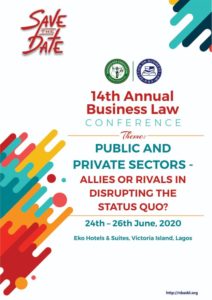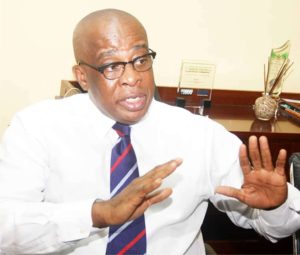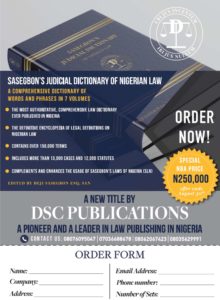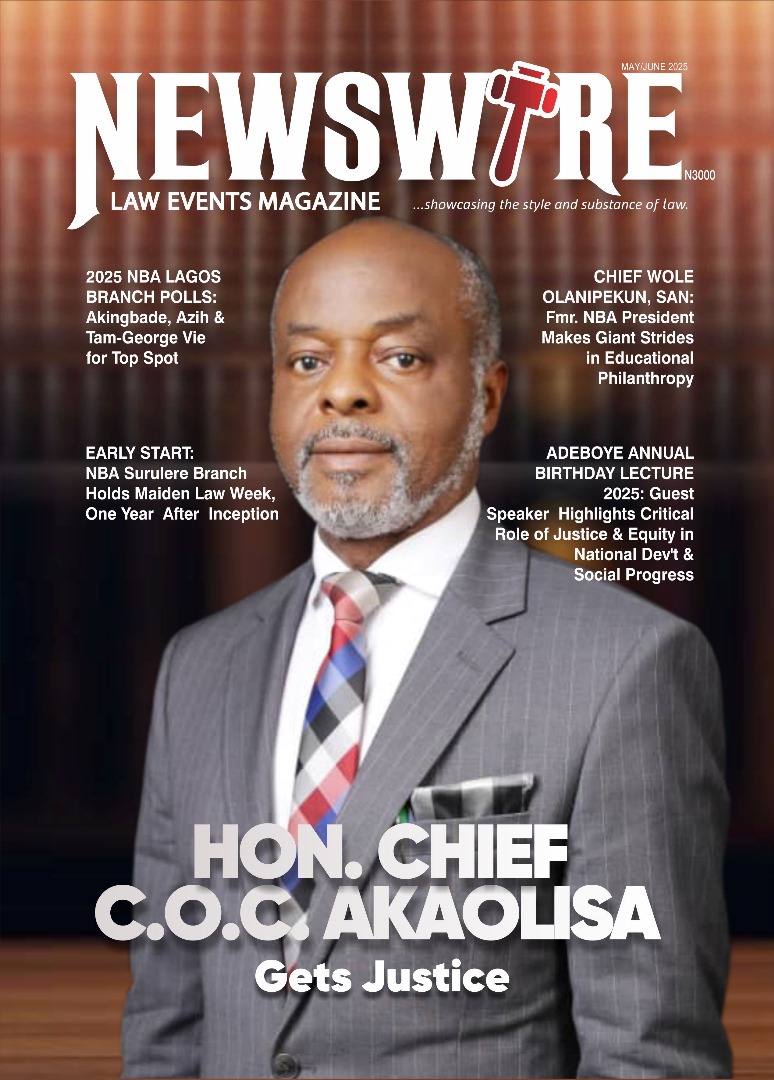

ADEDAPO TUNDE-OLOWU – Bridging the Gap Between the Aviation, Litigation, Arbitration & Advocacy
A litigator and arbitrator of no mean stature, boasting extensive experience and expertise in various areas of practice, notably aviation, since his call to the Nigerian bar in 1988, Adedapo Tunde-Olowu, FCIArb, FCTI, has represented a wide range of high-end clients in a number of critical transactions over the years.
A notary public since 2006, and an influential member of the Nigerian Bar Association, Tunde-Olowu is listed in both the prestigious 500 EMEA and the 2018 edition of the Who’s Who Legal Nigeria for his virtuosity in both litigation and arbitration, as well as his deftness in dispute resolution. His passion for the development of Nigeria’s legal jurisprudence is the motivating factor behind his work as Head of the Editorial Team of the Aviation Law Report in Nigeria (AVLRN), a compendium of judgements of higher appellate courts, especially on aviation-related matters.
In this conversation with our correspondent, Tunde-Olowu gives his unique take on the practice of law in Nigeria, and in particular his professional preoccupations and projects.

Why have you chosen to report judgments in a particular practice area?
In the course of my over 30 years as a lawyer, I discovered gaps in law reporting of court decisions in certain practice areas, notable among which are aviation and intellectual property. This discovery and my passion to contribute my little quota to the development of Nigeria’s legal system motivated me to embark on this project, starting first with aviation. We are presently working on a report covering decisions in intellectual property.
We decided to begin with aviation because it is one of the key sectors of the Nigerian economy. It is reported that the aviation sector contributes about USD10 billion to Nigeria’s GDP. Aviation provides an efficient and rapid worldwide transportation network, making it essential for global business. It generates economic growth, creates jobs, and facilitates international trade and tourism.
As My Lord, the Honourable Chief Justice of Nigeria (CJN), Mr. Justice Tanko Muhammad, rightly stated in the foreword to the first edition of the AVLRN
“…the increase in air passenger and cargo traffic has resulted in a surge in claims arising from the carriage of passengers and cargo by air. It therefore becomes imperative to have the decisions of our courts in all aviation related cases documented in a comprehensive law report to serve as a one-stop authoritative source for Nigerian case law on carriage of persons and goods by air.”
Why do you think the AVLRN is unique bearing in mind the fact that there are several other law reports in circulation in Nigeria?
The AVLRN is remarkably different from the existing law reports. The format and print quality are unique. The report covers decisions of the superior courts of records in Nigeria (i.e. the Federal High Court, the Court of Appeal and the Supreme Court). This means we are able to provide all actors/stakeholders in the aviation sector (including the bar and the bench, academia and government agencies) with a comprehensive and authoritative reference material. This makes the AVLRN unique. But beyond this, we are tech-minded and innovative. In this light, one of our plans is to roll out an e-version of the AVLRN in order to give our readers access to these decisions anywhere in the world.
Lawyers in Nigeria are increasingly becoming tech savvy. Do you intend to publish electronic versions of the report?
We understand the place of innovation in the growth of any human endeavor. In the wake of technological advancements, electronic reports have made complex and time-consuming research much simpler and time-efficient. Certainly, we will publish an online version so that users who prefer to use online libraries can have access to the electronic version of the reports.
What are your views on conflicting judgments of our courts? What are your suggestions for dealing with this issue?
We operate a common law system, where the principle of stare decisis applies. Stare decisis refers to the doctrine of precedent, which obliges judges to decide cases in accordance with previous decisions by a superior higher court in similar cases. The rationale for stare decisis is to ensure consistency and predictability in our jurisprudence. The task of a lawyer is made easier when the jurisprudence of the courts on a particular issue is consistent across appellate courts with co-ordinate jurisdiction. Similarly, the certainty of the law ensures that individuals and businesses can go about their endeavors knowing what to expect when disputes arises. Conflicting judgments present a challenge to the administration of justice because it introduces uncertainty.
First, our courts must set up comprehensive databases of all their judgments. For example, in the past, in Lagos State, we used to have the Cyclostyled Copies of the Judgment of the High Court (CCHCJ), which covered judgments of the High Court of Lagos State. We also used to have the Federal High Court of Nigeria Law Reports. With technological advancements, it is easier to set up these databases of judgments. With this in place, it will be easy for judges to leverage the technology necessary to keep track of new judgments.
More importantly, lawyers are ministers in the temple of justice. Lawyers have a duty to the court and the administration of justice is paramount. A lawyer cannot under any circumstances misstate or misrepresent the law. He has a duty to disclose all the decisions relevant to his case. It does not matter if the decisions strengthen or weaken his case. It is irrelevant that opposing counsel is unaware of such decisions and has not relied on them. Judges are human and are neither omniscient nor infallible. Judges rely on the submissions of lawyers appearing before them.
Tell us a bit about your background. Your name, the university you attended and when you were called to the Bar.
My name is Adedapo Osariuyime Tunde-Olowu. I attended the University of Benin and obtained an LL.B. in 1987. I was admitted to practice law in Nigeria in 1988 and in England and Wales in 2009. I also hold a Master of Laws Degree from the University of Lagos. I am a notary public.
I am a Fellow of the Chartered Institute of Arbitrators (UK) and the Chartered Institute of Taxation. I am also a member of the Nigerian Bar Association, the International Bar Association, the London Court of International Arbitration (African Users’ Council) and the Law Society of England and Wales. I am on the Kigali International Arbitration Centre’s panel of international arbitrators.
As a law practitioner, in what ways would COVID-19 impact the legal profession?
COVID-19 has literally brought life and business, as we know it to a grinding halt. The human race is battling to save itself from an existential threat of epic proportions. Various governments have taken drastic measures with a view to stanching the spread of the deadly virus.
On 29 March2020, in an address to the nation, President Buhari announced the cessation of all movements in Lagos State, Ogun State and the FCT for an initial period of 14 days with effect from 11 pm on Monday, 30 March 2020. The President also directed citizens in these areas to stay at home and directed that travels to the aforementioned States be postponed. He also directed that all businesses and offices within these locations should be closed during this period.
As a result of the President’s announcement, many law firms have shut down their offices and are now working remotely. The courts are virtually shut. The pandemic and the resulting governmental response have adversely affected the operations of businesses. Production has been impacted adversely and supply chains and markets are in disarray. The global economy is receiving a severe battering. Lawyers are not immune from these effects. For some lawyers, this will result in unemployment. So, overall, COVID-19 is a monumental and unprecedented disruption to the global economy and we can only hope that this nightmare blows away soon.
How would the present closure of Nigeria’s domestic and international airports affect the Nigerian aviation sector?
As you are aware, there is no domestic and international passenger traffic with the closure of the airports. Aircrafts are lying idle on airport tarmacs. Pilots, cabin crews, ticketing, catering staff, air traffic controller have suddenly become redundant. Certainly, these disruptions will result in severe losses for domestic and international carriers. Globally, governments will also lose significant revenue that would have accrued from this critical sector. Expectedly, there will be direct and indirect job losses across the air transport value chain. There is a report in today’s edition of The Guardian that Nigeria may slide into a recession if this shutdown continues for another two months with a potential loss of “2.27 trillion worth of trade and significant unemployment across all sectors. The forecast for the global economy is grim.
Why Aviation Law Reports amongst other areas of law practice?
This practice area is under reported. We want lawyers to feel the significance of the report to Nigeria’s jurisprudence, also to see the report is an invaluable research tool for legal practitioners, especially those in the aviation sector. The AVLRN is the first report in Nigeria publishing a selection of aviation case law from the Supreme Court, the Court of Appeal and the Federal High Court.
The Federal Government has floated the idea of establishing a national carrier without any success. What are the benefits for Nigeria if it embarks on such a huge venture bearing in mind its present economic realities?
You will recall that in July 2018, the Federal Government unveiled “Nigeria Air” as the name of the proposed national carrier at the Farnborough International Public Air show in London. The initial take-off date of the airline was 24 December 2018. The airline was to be private sector-led and driven. I am in support of establishing a national carrier for many reasons. Firstly, the establishment of a national airline will break the dominance of foreign airlines in Nigeria’s aviation sector and reduce capital flight. Secondly, a national airline is a very useful tool for boosting tourism. Thirdly, a national airline will generate employment for Nigerians. Fourthly, a national airline will enable Nigeria to fully utilise its bilateral air service agreements (BASA) with other countries. Fifthly, a national airline will inevitably lead to the setting up of aircraft maintenance, repair and overhaul (MRO) facilities within the country in Nigeria. An MRO will stem capital flight from MROs carried out abroad by local airlines.
However, it is my view that government’s involvement in running an airline should be limited because government-run national carriers are inefficient and unsustainable. The reason is simple. Government does not have the resources, managerial and technical expertise to successfully run an airline. To attract investors and reputable technical partners, government should provide an enabling environment for a private-sector driven aviation sector. This will ensure a steady flow of revenue for government.
Even if government insists on participating in the establishment of a national carrier, its participation must be under a private public partnership framework in which government holds minority shares. Government and must not be involved in running the business.
What are your thoughts about the future of the practice of aviation law in Nigeria?
According to a report by the International Air Transport Association (IATA), 7.2 billion passengers are expected to travel in 2035, a near doubling of the 3.8 billion air travelers in 2016. The prediction is based on a 3.7% annual Compound Average Growth Rate (CAGR) noted in the release of the latest update to the association’s 20-Year Air Passenger Forecast.
Nigeria is a player in this global industry, and our population and market size place us in a vantage position. With the flurry of activities in this key sector comes a demand for the services of lawyers. Lawyers in this practice area will continue to play a key role in providing guidance to investors and government on the legal and regulatory aspects of aviation business.
Why have you chosen to report decisions in a particular practice area?
I discovered gaps in law reporting of court decisions in certain practice areas, notable among which are aviation and intellectual property. That inspired me to want to contribute my quota to the development of our legal system.
Publishing is an expensive business in Nigeria. How do you intend to sustain this publication?
Our immediate goal is not profitability. In publishing, it takes some time to make profit, particularly when you take into consideration the quality of the print of the report and the amount of time spent in producing it. Profit is a long-term goal. We plan to create awareness amongst the players in the aviation sector for whom the AVLRN is designed. Once this is achieved, we will continue to devise innovate strategies to sustain the interest of our readership. The AVLRN is different from most of the existing law reports. It contains decisions of all superior courts of records in Nigeria (i.e. the Federal High Court, the Court of Appeal and the Supreme Court. Readers will have the advantage of following the opinions of the various courts on different issues. In my view, the AVLRN is unique because it is a comprehensive and authoritative reference material.
We are grateful to the Honourable Chief Justice of the Federation, the President of the Court of Appeal and the Chief Judge of the Federal High Court who graciously granted us permission to report the judgments. Beyond this, we are technology-minded and innovative and one of our plans is to roll out an e-version of the AVLRN in order to give our readers access anywhere in the world. So, I would advise readers to watch this space!
How regular will the report be, weekly, monthly or what?
We plan to publish the AVLRN on a quarterly basis
Which decisions of court will get reported, high, appeal or apex court?
The AVLRN contains decisions of all superior courts of records in Nigeria, from the Federal High Court to the Apex Court. And like I said earlier, readers will have the great benefit of following the opinions of the various courts on different issues.
Deji Sasegbon’s Latest Dictionary: Place your order now. Call:08076095047, 07036688678, 08035629991

Newswire, we present the world of law and the issues that engage them. This edition is yet again, ‘Mind-blowing’. Go get your copy(ies) Now!


Do you need to be heard? Or your articles published? Send your views, messages, articles or press release to: newswiremagazine@yahoo.co.uk >>> We can cover your (LAW) events at the first Call: 08039218044, 08024004726, 09070309355
-Advertisement-
Grab our latest Magazine, "Hon. Chief C.O.C Akaolisa gets justice". Get your order fast and stress free.
For more details about Newswire Law&Events Magazine, kindly reach out to us on 08039218044, 09070309355. Email: newswiremagazine@yahoo.co.uk. You will be glad you did






